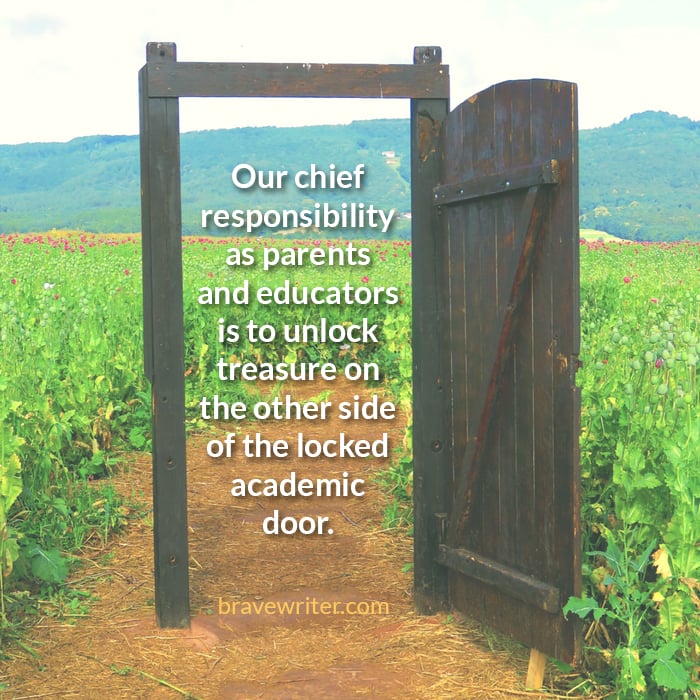A Little Enchantment Goes a Long Way

We see passion in chess tournaments—and applaud it.
We see passion in video gaming—and shame it.
Same skills—same immersive, passionate engagement.
What’s going on here?
Why aren’t our kids more interested in chess (we wonder)? Why are video games so compelling to kids (we hand wring)?
Because video games are enchanting. They are filled with treasure hunts, mysteries, problems to solve, doors to unlock with special keys, magical appearances, plinks and shimmers of sound and visual delight. Video game-makers create passionate fans because they know how to build worlds that enchant children!
Which frustrates the living day lights out of most of us!
I get asked: Is it possible to enchant academics? I say a resounding “Yes!”
Adults need a paradigm shift. We need to refrain from asking if what children are learning will serve them later and instead look at what they are learning right now that they value.
Let me say that again.
Our chief responsibility as parents and educators is to unlock treasure on the other side of the locked academic door. We want to move from “Pages completed” IS the goal of education to asking: What’s the mystery, surprise, risk and adventure inherent in fractions or pronouns or the revolutionary war?
No one learns to read so that they can
pass a test or complete a work book.
We become enthusiastic readers because there are stories —surprises, heartaches, relationships, the keys to becoming a whole healthy happy loved person, the dire mistakes made by others laid before us so we might learn to do better.
We read to become proficient in repairing a lawn mower or to bake a pineapple upside down cake! We read for the playfulness of language—the linguistic gymnastics of poetry and tongue twisters! Why is math different? What is the exceptional experience of becoming mathematically proficient?
The kids who catch on play with math like to play with Legos or video games. They program or build, they apply math to their ordinary lives and you never hear about it (it happens inside).
I remember Noah created a multiplication table that was built from base 12. That means he introduced two new characters into his multiplication system, and then had to actually carry those digits through as he multiplied. And he did it. Himself. No assignment. That little times table lived in his wallet for years.
You should also know that in his math class in high school, he wrote poems during his first math test. Math, poetry—they were friends, not separate subjects.
Learning because you want to know is possible for everyone.
It isn’t just for the few. It isn’t “Well my kid isn’t that interested in learning” or “You haven’t met my kids.”
Learning is so natural, your children are already passionate fans of it. What adults sometimes fail to see is the passion inside the child’s mind.
The passionate interest of a child is invisible to the parent/educator and therefore, it goes unappreciated or even unknown! Sometimes when we find out what’s there, we don’t value it at all.
What we’ve done in the name of education
is strip learning of its magical powers.
I like to say that the least taught literary element in writing is: surprise. Yet everything in writing depends on it. Surprising language, plot twists, unexpected facts, a quote about a topic that is shocking given who said it—this is how writers find readers every day. They say what no one will say or they say it in a way you haven’t heard it before.
You will stop reading if there is no surprise coming. If you think you know what’s ahead, you won’t finish the book or the page or the article.
Take that principle—the element of surprise, the element of subversion, of mystery, of risk, and adventure—and right now, apply it to your homeschool.
Is your homeschool surprising?
Is it in any way an adventure?
Make it smaller. Is there anything to look forward to, today, in my home?
Homeschools gone wrong are trying too often to apply systems. Parents are looking to eliminate surprises (like low scores, or unruly behavior, or messes, or distractions). We are literally working against our best ally for education most days.
What if you embraced what you consider an obstruction to your carefully planned curriculum? What if you could see the magic in the mess, in the rabbit trail, in the off-task inspiration? What if you could do that just once this week (not every day, not every time)?
Give your kids the chance to surprise you. You don’t have to create surprises for them nearly as much as you need to be open to the element of surprise in them. The next time someone asks you to look at what they are reading, doing, seeing, STOP—and read, watch, be interested. Get inside that amazing mind of your child. It is all mystery and surprise in there!
There is enough in the mind of a child to lead to a lasting education for a lifetime.


















